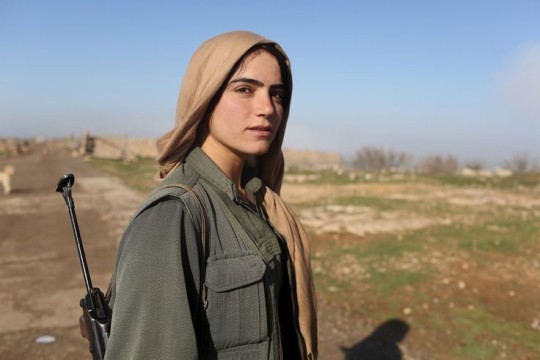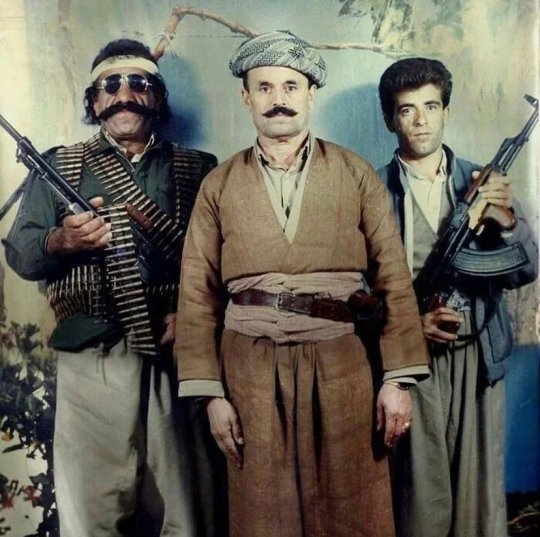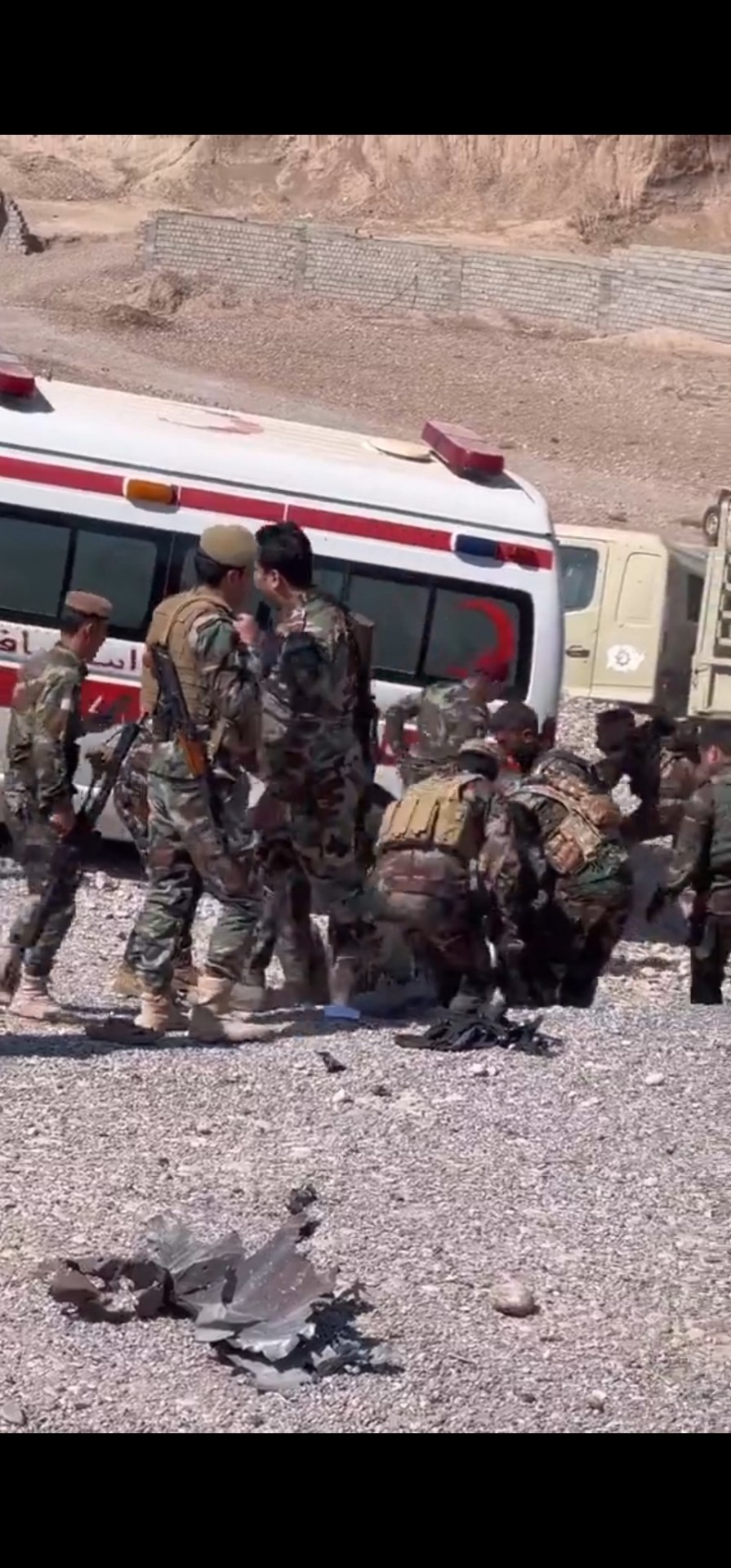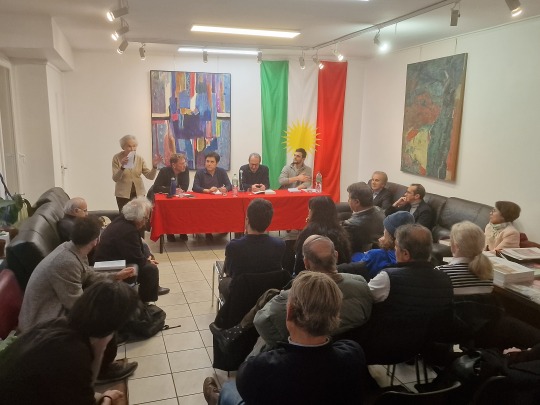#Peshmerga
Photo

Peshmerga.
8 notes
·
View notes
Photo

Kurdish troops known as peshmerga play volleyball near Kirkuk. Kurdish forces fought against the Islamic State when it began to capture Iraqi towns in 2014. 2019.
PHOTOGRAPH BY YURI KOZYREV, NAT GEO IMAGE COLLECTION
8 notes
·
View notes
Text

#IFTTT#Flickr#zodiacs#kurdi#ھێزەکانی#خەبات#البيشمركة#mongola#بارزان#europe#پیران#israel#français#french#پارتی#دیموكراتی#كوردستان#peshmerga#peshmerge#barzani#beyto#can#یارسان#semsûr#dîlok#êlih#wan#nusaybîn#mêrdîn#colemerg
4 notes
·
View notes
Text
پـێـشمەرگایەتی ڕێکا سەرفرازی و قەھرەمانی و شەڕەفێ
٢٠١٧/٩/٢٥ڕیــفڕاندوما سـەربخوییێ یا کـــــوردستانێ
سەربخویی حەقــێ مەیە کەس چ خێرا پمە ناکەت
1 note
·
View note
Text

11 notes
·
View notes
Text
Attaques de drones : après les bases américaines, les milices chiites s'en prennent à une base des peshmergas, au nord-est d'Erbil
Le KRG a annoncé ce dimanche que deux drones chargés d'explosifs avaient visé une base de peshmergas dans la nuit de samedi à dimanche. Cette attaque qui s'est passée à 23h45 au nord-est d'Erbil, dans le district de Pirmam, a fait des dégâts matériels sans faire de blessés. Le porte parole du KRG parle d'une attaque lâche perpétrée par des groupes hors la loi liés au gouvernement qui est tenu pour responsable.

"Nous tenons ces groupes et le gouvernement fédéral pour responsables de ces attaques lâches, parce que ces groupes hors-la-loi sont armés et reçoivent des salaires du gouvernement fédéral, et ils se promènent sous les yeux du gouvernement irakien, transportant des armes, des roquettes, et des drones afin de mener des attaques terroristes contre des institutions officielles et militaires", peut-on lire dans le communiqué.
Le KRG attend que le Premier ministre irakien Mohammed Shia’ al-Sudani punisse ces groupes en prenant des "mesures sérieuses pour poursuivre les agresseurs". Il ajoute qu’Erbil se réserve le droit de répondre à ces attaques "au moment opportun". Il a également appelé ses alliés à soutenir Erbil face à de telles frappes.

Cet événement survient 36 heures après que le KRG a réaffirmé vendredi qu’il n’y avait pas de bases israéliennes dans la région, contredisant les affirmations de la Résistance islamique qui affirmait avoir ciblé une base "sioniste" peu avant à Erbil.
De son côté, le réseau des milices chiites soutenues par l’Iran et affiliées au Corps des Gardiens de la révolution islamique, a déclaré samedi soir avoir ciblé la base aérienne de Harir à Erbil avec des drones. C'est ce même groupe qui a revendiqué la plupart des attaques contre les troupes américaines en Irak (2500 soldats) et en Syrie (900 soldats) depuis le 7 octobre, date de l'attaque terroriste du Hamas qui a visé principalement des civils en Israël. La réplique attendue d'Israël et les conséquences sur les civils Palestiniens font craindre un embrasement de la région, ce qui ne manquerait pas d'impacter les forces Kurdes considérées comme alliées des États-Unis, le principal soutien d'Israël. D'où la confusion entretenue par les milices chiites entre les forces américaines et Israéliennes au détriment des Kurdes assimilés indirectement aux alliés d'Israël.
A noter que les Kurdes sont aussi régulièrement bombardés par la Turquie, au Kurdistan Sud comme au Rojava, raison pour laquelle certains demandent des armes de défense antiaérienne en urgence aux États-Unis.
Sans cela, c'est l'existence même des deux régions autonomes qui pourrait être remise en question si la situation devait continuer à se tendre au Moyen-Orient. Et donc, les États-Unis qui pourraient perdre des alliés fidèles.
0 notes
Text
« Sans le PKK, Hewlêr aurait pu tomber aux mains de l’EI » (ancien commandant des peshmergas)
« Sans le PKK, Hewlêr aurait pu tomber aux mains de l’EI » (ancien commandant des peshmergas)
Sans l’intervention de la guérilla, l’EI aurait pu envahir Hewlêr et Zakho en 2014, affirme l’ancien commandant peshmerga Riyad Selahaddin.
Originaire de Qamishlo au Rojava, Riyad Selahaddin a migré avec sa famille au Kurdistan du Sud (nord de l’Irak) en 1980. Entre 1991 et 2003, il a été commandant des peshmergas du Parti démocratique du Kurdistan (PDK du clan Barzani), avant de commander les…

View On WordPress
0 notes
Text

Peshmerga in the mountains, Kurdistan, Summer of 1965.
49 notes
·
View notes
Text
as an internationalist: i wish people would care about kurdistan the same way they care about palestine.
kurdistan has been at war and fighting for their independence since 1923.
they were met with hundreds of genocides and massacres by turkey, iran, iraq and syria.
kurdish people have been targeted by ultra-nationalist turks since last week in belgium.
kurds fled their country to live in peace but are met with violence abroad as well.
kurds saved us from isis – pkk, ypg/j, peshmerga.
the kurdish freedom movement invented “jin, jiyan, azadi” and now people act like it’s from iran.
if you’re for freedom you should be for kurdistan.
her biji kurd u kurdistan, biji serok apo.
17 notes
·
View notes
Note
I was referring to the Kurds that the USA backs in Iraq the Ypg and Peshmerga
Neither of these militias are communist
17 notes
·
View notes
Text
For most American audiences, the female fighter exists in a land far, far away. To consider female militancy in this country, in our movements, requires a reckoning: the need to see police brutality against Black women as state violence, checkpoints in school cafeterias as militarization, and the death rates from domestic and mass violence as mimicking the figures of a war zone. Each of these realities disrupts self-satisfied notions of America, and all are hinged on the positioning of women denied political power and forbidden violence. In response to an essay I co-authored—a piece highlighting the politics of women who kill their abusers—an editor critiqued the argument as "deeply problematic," claiming it created a "homology between women who take up political violence, such as the Kurdish women of the Peshmerga (PKK), and women who use criminal violence." The real root of his concern, however, is the idea that civilized nations were mentioned alongside the behavior of women in darker nations—"it erases a vital distinction between armed struggle where the state has lost the legitimacy of its monopoly on the use of force, and a vigilante-style revenge attack in a rule-of-law democratic society." In his imagined America, an indiscriminate law will protect women from violence.
-Nimmi Gowrinathan, Radicalizing Her: Why Women Choose Violence.
37 notes
·
View notes
Text

Choose Freedom
‘Every girl is born into a cage’: exiled Kurdish women fighting for freedom in Iraq Kurdish women living in Iran face discrimination for their ethnicity as well as their gender.
The photographer Keiwan Fatehi spoke to those who were forced to leave their homeland due to oppression, or fear for their safety and joined the peshmerga military
Image: Roja, 16, from Paveh, Rojhelat (Iranian Kurdistan), left her home on 6 September 2022. She says she left in reaction to the feeling ‘of being a second-class citizen in Iran’.
Photography | Keiwan Fatehi/Middle East Images / Guardian Newspaper
5 notes
·
View notes
Text
PM Barzani reiterates importance of maintaining duties of Coalition forces in Iraq - Kurdistan24
[Kurdistan24 is KDP-owned Media]
Kurdistan Region Prime Minister Masrour Barzani on Tuesday stressed the importance of maintaining the duties of the US-led Coalition against ISIS to assist the Iraqi army and the Peshmerga forces in combatting terrorism and safeguarding security and stability.
Barzani’s remarks came during a meeting he held in Erbil with the commander of the Combined Joint Task Force-Operation Inherent Resolve, Major General Joel B. Vowell, and his accompanying delegation, according to a statement from the premier’s office.
Discussing the stability and security of Iraq and the Kurdistan Region, Barzani stressed the importance of maintaining the duties of the Coalition against ISIS for the sake of assisting the Iraqi army and the Region’s Peshmerga in the fight against terrorism and safeguarding stability, per the statement.[...]
US Consul General Erbil Mark Stroh also attended the meeting, in which the latest political developments in the Kurdistan Region, Syria, and Iraq were discussed.
9 Jan 24
5 notes
·
View notes
Text

#IFTTT#Flickr#بارزان#swiss#laboratory#romania#كوردستان#أربيل#کورد#کوردستان#هەڵەبجە#herêmakurdistanê#halabja#hewlêr#arbil#پێشمەرگە#peshmerga#peshmerge#terrorist#kurd#kurdish#زانیاری#استقلال#الأمة#الكوردية#newroz#newrozê#eyreqîb#هەورامی#السياسية
3 notes
·
View notes
Text
"Le gouvernement des Kurdes, le gouvernement partisan et ordres sociaux alternatifs", un livre recommandé par l'Institut kurde de Paris
Joyce Blau - cofondatrice de l'Institut kurde de Paris - ne tarit pas d'éloge sur l'ouvrage collectif "Le gouvernement des Kurdes, gouvernement partisan et ordres sociaux alternatifs" qui vient de paraître aux éditions Karthala, sous la direction de Gilles Dorronsoro. Un gage de sérieux pour un livre qui n'a pas d'équivalent jusqu'ici.

Joyce Blau a introduit la conférence de Gilles Dorronsoro, Olivier Grosjean, Hardy Mède et Nicolas Ressler-Fessy. / Photo B. D.
Les nombreux auditeurs de la conférence donnée le 16 décembre à l'IKP ont été particulièrement attentifs aux propos de Gilles Dorronsoro, professeur de science politique enseignant à l’Université Paris 1 Panthéon-Sorbonne, et de trois des co-auteurs (1) venus présenter le livre avec lui, samedi : Olivier Grojean, maître de conférences à l’Université Paris 1 Panthéon-Sorbonne; Hardy Mède, associé à l’Université Paris 1 Panthéon-Sorbonne mais aussi enseignant à l’Institut catholique de Paris; et enfin Nicolas Ressler-Fessy, chargé de cours à l'Institut national des langues et civilisations orientales, par ailleurs membre du programme Turquie de Noria-Research.
Tous se sont penchés sur une période exceptionnelle depuis la fin de l'Empire Ottoman, les trois décennies qui ont vu "la pointe de fer des Etats régionaux" desserrer leur étreinte autour des Kurdes qui sont des dizaines de millions répartis sur l'Iran, la Turquie, l'Irak et la Syrie depuis le Traité de Lausanne signé en 1923. Comme le rappellent les auteurs dans leur quatrième de couverture, cela fait donc un siècle que les Kurdes "se mobilisent régulièrement pour obtenir des droits culturels, une autonomie régionale, voire l'indépendance".
Lire mon article : "Un génocide oublié, 100 ans de solitude pour les Kurdes"
Si la perspective d'un Etat kurde n'a jamais été aussi lointaine pour des Kurdes en partie lâchés par leurs alliés occidentaux après la victoire contre Daesh, toutes les années de lutte n'ont pas été vaines, que ce soit celles du PDK et de l'UPK à Bashur (Kurdistan Sud, au nord de l'Irak), celles du YPG/PYD au Rojava (Kurdistan Ouest, au nord de la Syrie), ou encore celles du PKK à Baqur (Kurdistan Nord, est/sud-est de la Turquie) et chez ses voisins.
Une date constitue à cet égard un moment de bascule, la résolution 688 du Conseil de sécurité des Nations Unies, adoptée le 5 avril 1991, qui crée une "no-fly zone" au-dessus du Kurdistan irakien victime d'un terrible génocide pendant les années Saddam, l'opération Anfal.
Commander mon livre "Un génocide oublié, la voix brisée du peuple kurde"
Protégés des bombardements chimiques et des crimes de masse, les peshmergas des deux principaux partis se livrent bientôt une guerre fratricide, jusqu'à ce que la guerre civile entre PDK et UPK débouche finalement sur un accord signé en septembre 1998 sous l'égide des États-Unis, prélude à la création de la Région autonome du Kurdistan irakien.
La guérilla du PKK qui s'étend de son côté au Rojava ainsi que les interventions américaines en Irak et en Syrie vont par ailleurs favoriser le PYD, fondé en 2003 par des membres syriens du PKK à Qandîl, dans les montagnes du Kurdistan irakien.
Résultat, pour la première fois, des populations kurdes sont gouvernées par des mouvements kurdes. Et c'est bien là l'objet du livre dont il est question ici.
A rebours d’une conception romantique et loin des clichés sur les tribus kurdes, les auteurs montrent la centralité des partis politiques dans l’organisation des ordres sociaux alternatifs en vigueur au nord de l'Irak et de la Syrie mais aussi en Turquie, notamment à Baqur qui va bénéficier entre 2013 et 2015 des bienfaits d'un cessez-le-feu entre le PKK et le pouvoir, au bénéfice du HDP pro-Kurde créé en 2012.
A partir de données originales tirées de temps longs passés sur le terrain en Turquie, en Irak et en Syrie, les auteurs analysent ces «gouvernements partisans» dans toute leur complexité. Un travail d'autant plus intéressant que les mouvements kurdes se trouvent confrontés à la gestion de minorités non kurdes, notamment en Irak et en Syrie, provoquant une adaptation du programme politique ou la mise en place de régimes discriminatoires, selon les cas.
Pour en savoir plus, il faut lire "Le gouvernement des Kurdes, le gouvernement partisan et ordres sociaux alternatifs", sous la direction de Gilles Dorronsoro, Paris, Karthala, 2023, 368p. Vendu au prix de 30€. Gilles Dorronsoro qui a annoncé que l'ouvrage allait être traduit en anglais très bientôt.
(1) Ont aussi contribué à cet ouvrage : Yohanan Benhaïm, Boris James, Sarah Guillemet, Patrick Haenni, Felix Legrand, Jean-François Pérouse, Cléa Pineau, Arthur Quesnay, Clémence Scalbert Yücel.
2 notes
·
View notes
Text
In a private letter delivered to the White House earlier this month, the prime minister of the Kurdistan Region of Iraq warned that Kurdistan—and Iraq’s post-2003 federal system—faces imminent collapse unless the United States intervenes. Masrour Barzani sent his extraordinary warning amid mounting political and economic challenges for the autonomous region and an increasingly belligerent government in Baghdad.
The Kurdistan Regional Government (KRG) is important to U.S. interests in several ways. Its Peshmerga forces are key partners in the fight against the Islamic State and other extremist groups and crucial to the West’s counterterrorism efforts in both Iraq and Syria. The region has historically constituted a buffer against tumult and turmoil in the rest of Iraq, providing a safe haven for nearly 1 million internally displaced people and refugees, while also containing the ascension of militant Iran-backed militia groups responsible for conducting numerous attacks on Western forces.
However, with Washington now preoccupied by its intensifying rivalry with China and the war in Ukraine, little attention is being paid to Kurdistan. Sensing America’s focus is elsewhere, the KRG’s rivals, including militia groups designated as terrorists by the United States, have started circling. Kurdistan’s collapse would spell upheaval and chaos with implications stretching well beyond Iraq.
The KRG has endured a string of troubles in recent years. Soon after Barzani took office in 2019, his cabinet was confronted with a pandemic, a military escalation between the United States and Iran and its affiliated militias, and an economic crisis after oil revenues took a huge hit when crude prices plummeted in 2020.
Kurdistan has also been undermined by the rivalry between the two largest political parties, Barzani’s Kurdistan Democratic Party (KDP) and the Patriotic Union of Kurdistan (PUK). Their division weakened the Kurds’ bargaining power in Baghdad during negotiations over forming an Iraqi government after the 2021 parliamentary elections. Iran and its allies, including the Popular Mobilization Force (PMF)—the 200,000-strong umbrella militia organization—exploited Kurdish discord by allying with the PUK to expand their influence over the Iraqi state.
Iran-backed groups have also consolidated their control over the Iraqi judiciary, paving the way for a February 2022 ruling that Kurdish oil exports through Turkey were illegal. This influenced an international arbitration decision a year later that came to the same conclusion. Since then, Kurdish oil exports have stopped, crippling the region’s economy and impacting global energy markets—a win for the PMF and its hopes of neutering Kurdistan’s economic independence.
Earlier this month, Iran-aligned groups massacred Kurdish protesters in the disputed oil-rich city of Kirkuk, which Kurdish forces had withdrawn from in 2017 after the PMF mobilized its militias with federal government backing. As part of an agreement between Iraqi Prime Minister Mohammed Shia al-Sudani and Barzani, the KDP was to return to a base in the city, but the PMF moved to torpedo this by blocking a highway connecting Kirkuk to Erbil and other Kurdish provinces in August. The disruption to the lives of people who rely on the highway daily prompted the protests. Following the massacre, the Federal Supreme Court in Baghdad, which is aligned with the PMF, suspended the order for the KDP’s return.
The divisions between the KDP and PUK have deeply undermined the KRG. Indeed, fraternal rivalry has been the Kurds’ Achilles’ heel for decades. Between 1994 and 1998, the two parties fought a civil war for control of the region, which was finally resolved through U.S. mediation. Their 1998 peace settlement paved the way for a strategic agreement that became the basis for Kurdistan’s golden era after the U.S.-led invasion of Iraq in 2003, which gifted the Kurds outsized influence over the Iraqi state, expanded their autonomy, and precipitated an unprecedented economic boom.
While today’s rivalry represents a clash of personalities within a new generation of Kurdish leaders, it also reflects the two parties’ respective trajectories since 2003. The KDP owes much of its power to its long-standing organizational discipline, which has delivered it electoral success and allowed it to control the prime minister’s office since 2012. The PUK, on the other hand, has been factionalized almost since its inception in the 1970s. In 2021, Bafel Talabani launched a coup to oust his cousin Lahur as co-chair of the party and head of its counterterrorism and intelligence forces.
These violent dynamics have degraded the PUK’s ability to present a serious alternative to the KDP. Instead, it has opted for spoiler tactics, working with Iran-aligned groups in Baghdad to undermine its rival politically and economically. The PUK leadership regularly courts Iran-aligned individuals and factions sanctioned by the U.S. Treasury Department, sometimes against the backdrop of missile and drone attacks on Kurdistan by these groups.
This raises serious questions for Washington and its relationship with the party, but also for the PUK itself. Looking to Iran and Baghdad may help the PUK reassert itself locally, but undermining Kurdistan as a whole to weaken the KDP is dangerously myopic since it relies on the good faith of the PMF, and it is potentially existential as it risks gambling the autonomy of Kurdistan in the long term.
Kurdish woes and Iranian encroachment into Kurdistan have far-reaching implications for U.S. interests. The KRG is a vital ally in the campaign to secure the enduring defeat of the Islamic State. Intra-Kurdish divisions, Iran’s attempts to subjugate the Iraqi state, and Kurdistan’s economic turmoil all undermine the U.S. campaign against the Islamic State and empower Iranian-backed militant groups designated by Washington as terrorists. The U.S. base in Erbil province is one of Washington’s most important military bases and listening posts in the Middle East, serving as a special operations hub and a staging site for operations in both Iraq and Syria.
The very presence of this base requires a political order that is conducive to maintaining the U.S.-KRG partnership, something Iran is hoping to weaken and, eventually, demolish by instrumentalizing the PUK. Iran has proved willing to play the long game to supplant the United States in Kurdistan, as it has done in Baghdad over the past two decades.
Washington must, therefore, step in to pressure the PUK into ending its collusion with Tehran. The PUK and its leadership risk breaching U.S. sanctions that are designed to inhibit the capabilities of the designated Iran-aligned groups and officials the PUK partners with.
These sanctions could underscore an effort by Washington to establish red lines for the PUK, both to contain Iran’s encroachment and to protect the credibility of its sanctions infrastructure. Washington must also discourage the PUK from threatening to return Kurdistan to the dual administrative structure of the 1990s, which would effectively dissolve the autonomy of Kurdistan and its hard-won rights under the 2005 Iraqi constitution. This system saw the two ruling parties govern their stronghold provinces as two separate administrations and empowered Iraq’s neighbors, while undermining U.S. strategic interests in Iraq and the region.
Regional actors such as Turkey can also be brought into play. Ankara has escalated its drone attacks on the fighters and affiliates of the Turkish-Kurdish rebel group, the Kurdistan Workers’ Party (PKK), who have found refuge in Sulaymaniyah, the PUK’s stronghold province. That has destabilized the province and added to the party’s woes, despite the PUK’s efforts to discourage further strikes.
The PUK cannot force the PKK to withdraw, since this would trigger a violent conflict, but it can ill afford further Turkish attacks. However, it could strike a bargain with Ankara premised on a commitment to end its collusion with the PMF, which has PKK affiliates within its ranks. This would ensure that the PUK no longer directly or indirectly enables the PKK. It diminishes Iran’s influence, alleviates Turkish apprehensions, and reduces the geopolitical tensions that result from Turkish incursions.
Moreover, Washington has failed to resist or condemn Baghdad’s punitive measures against the KRG’s economy, which have been engineered by Iran-aligned groups through the subjugation of the judiciary in Baghdad. The suspension of Kurdistan’s oil exports has also stopped 500,000 barrels per day of Kurdish oil from reaching global markets: some 10 percent of Iraq’s total exports, or 0.5 percent of global production. This has reverberations well beyond the region; Europe has relied increasingly on Kurdish oil since Russia’s invasion of Ukraine.
The U.S. has so far been a bystander to both the intra-Kurdish escalation and Iran’s encroachment. Washington may believe that these problems are internal Kurdish matters, but this is a mistake. The ascension of the PMF and, therefore, its ability to exploit Kurdish discord can be directly tied to the legacy of U.S. engagement in Iraq over the past two decades, including Washington’s acquiescence to the group’s takeover of Kirkuk in 2017.
The KRG has proved resilient, but this has its limits. A full collapse of the region’s economy would ultimately force it to capitulate to Iran. In practice, this means giving Iran a greater say over the contours of the KRG’s institutions, its armed forces, borders, and, most importantly, the future of the U.S. base in Erbil.
Preventing this would require the United States to mediate intra-Kurdish tensions to unify Kurdish ranks in Baghdad to protect the KRG’s autonomy and restore its budgetary entitlements and its right to electorally contest disputed territories such as Kirkuk without being subjected to the coercive tactics of the PMF—while maintaining a healthy democratic rivalry at home.
If Washington is serious about safeguarding its interests, it could start by convincing the PUK that its best hope of reversing its decline is by addressing its internal crisis, and not by turning to Iran—a self-defeating exercise. The PUK will struggle to match the KDP’s political supremacy: At best, it can hope to slow its rival’s ascension. At worst, its collusion with Iran gambles the fates of both the party and Sulaymaniyah.
Secondly, the U.S. could focus its mediation on Kurdistan’s gas reserves, potentially addressing global shortages in the long term while propping up the KRG’s economy. The KDP has the political and constitutional legitimacy to move the sector forward and attract investors—but gas reserves are located primarily in PUK-controlled areas.
The U.S. could encourage dialogue over developing these gas fields and securing Kurdistan’s position in what the International Energy Agency has described as a “golden age” of natural gas. It is precisely here—at home, and not in Baghdad or Tehran—where the PUK, with U.S. support, can push for its economic stake through a comprehensive arrangement with the KDP that includes a revenue-sharing agreement.
Such a transactional engagement could be a stepping stone toward a wider settlement. The PUK blames the KDP for hoarding revenues and the fact that Sulaymaniyah has lagged behind other provinces, but that argument is weakened when Sulaymaniyah’s degradation is a reflection of the degradation of the PUK.
The correlation is not coincidental. By continuing with its current path, the PUK risks detaching Sulaymaniyah’s 700,000 inhabitants from the economic transformation being led by Barzani, which will only add to the frustration of its supporters. That reform agenda could rescue Kurdistan from dependence on oil by diversifying the economy, improving efficiency, and promoting good governance.
The alternative for the United States—standing by and watching the collapse of the KRG—would be a disaster for Iraq’s Kurds and for U.S. interests in the region. The KRG’s fate will play an important role in determining the contours of the wider Middle East.
2 notes
·
View notes